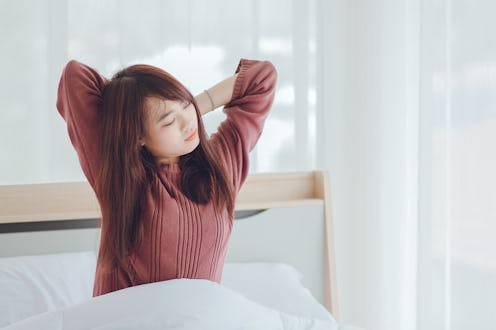Life
How DST Affects Your Health

I've already lamented the end of daylight saving time, which is Nov. 6, 2016, by the way. In addition to daylight saving time affecting your mental health — and no, I don't just mean the sadness over the fact that it will be getting dark earlier — changing the clocks back can have an impact on your physical health, too. For those of you who aren't aware and are living in blissful ignorance (which I'm about to shatter), on Nov. 6, 2016 at 2 a.m. we will "fall back," or set our clocks back one hour. For all those of us who love sleep — so like, everyone, I assume — that means you get one extra hour of shut-eye. Hooray! But there are also some less-than-thrilling outcomes of moving the clocks back. Let's get into some ways how daylight saving time affects your health, because knowledge is power.
Your Sleep May Take A Hit, And That Has Big Implications
Daylight saving time throws off your circadian rhythm — it turns out our bodies are wired to sleep according to the sun's movements and not man-made clocks, go figure — but this has larger health implications than just feeling a little groggy. WebMD notes that chronic sleep loss can lead to problems like heart disease, high blood pressure, stroke, and diabetes.
The good news is that when DST ends, as it does in the fall, our bodies bounce back — otherwise we'd all be in big trouble. However, there is one dark side of daylight saving time that isn't talked about as much as it should be: deaths caused by dangerous driving. Pedestrians are at a greater danger of being involved in a fatal accident when there is less sunlight, like when the sun sets early in the fall.
You're At A Lower Risk For Heart Attacks
Time for some good news: A 2008 study found that, while your risk of heart attack is greater in the first three days of DST in the spring because we lose an hour of sleep, your risk goes down immediately once daylight saving time ends in the fall.
You May Feel Unfocused
It's not uncommon to feel less alert after the fall switch. Even though we technically gain an hour of sleep by setting the clocks back, the lack of sunlight can cause many people to feel extra sleepy or sluggish. Dr. Chris Winter told Real Simple , "As we start losing sunlight, our body starts to produce melatonin," which is the hormone that makes us feel tired. So when it gets dark, which happens earlier and earlier after Nov. 6, 2016, you may start to feel sleepy earlier as well.
Cluster Headaches Might Crop Up
The end of daylight saving time has been linked to cluster headaches in some people. A cluster headache is a type of severe headache that recurs over a period of several weeks and is usually limited to one side of the head. Surprise: experts think they're caused by circadian rhythms in the brain. So yeah, your circadian rhythm is very important, and it's not something to be messed with. Thank you, inventors of daylight saving time, for doing precisely that.
Overall, it seems like many of the serious health problems attributed to daylight saving time occur in the spring, when we "spring forward." For example, a study conducted in February 2016 found that the overall rate of strokes was 8 percent higher in the two days after spring DST. Another study linked the Monday and Tuesday after spring daylight saving time with a 10 percent increase in heart attack rates. These risks are generally associated with disturbed sleep cycles and losing an hour of sleep. However, even though there are not as many serious negative consequences associated with the fall change of the clocks, it's still important to make sure you're maintaining a regular sleep cycle. As we've seen, not doing so can wreak havoc on your physical and mental well-being.
Images: Tongchai Sangruksawong / EyeEm/EyeEm/Getty Images; Giphy (4)